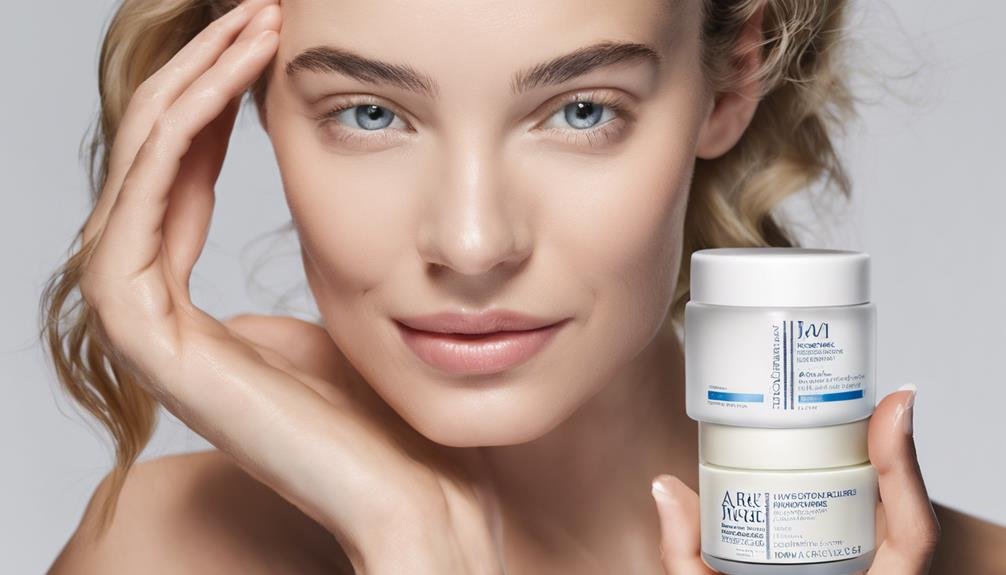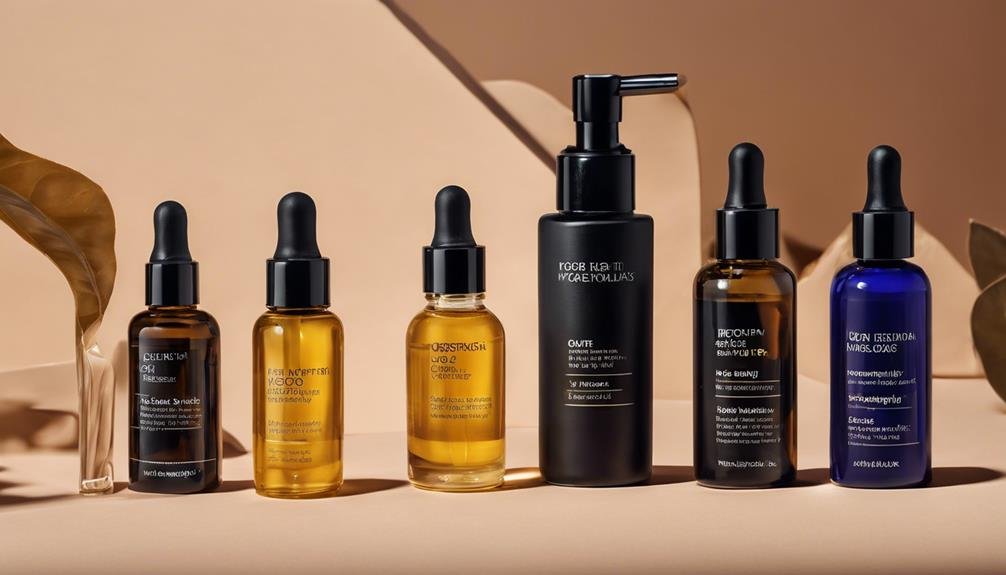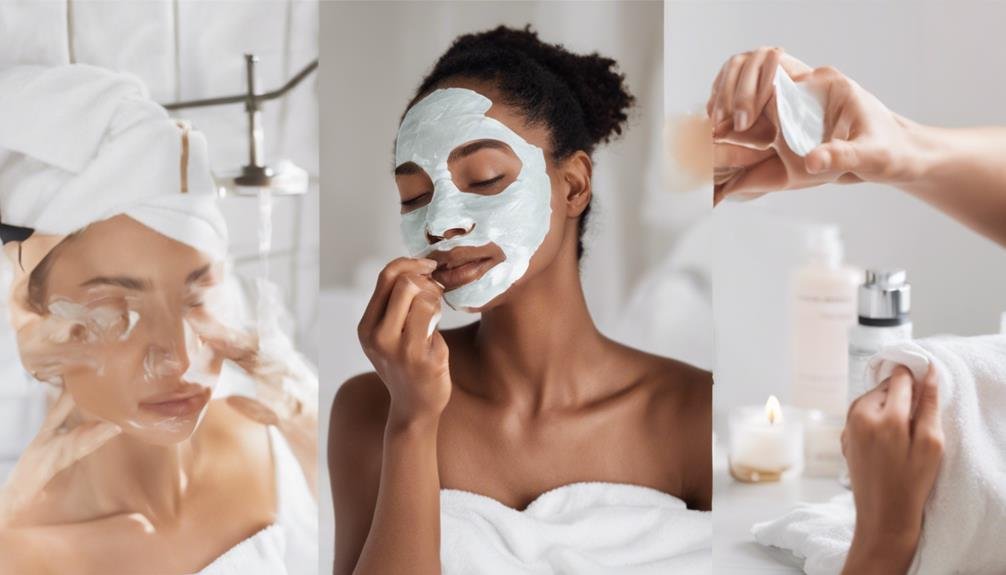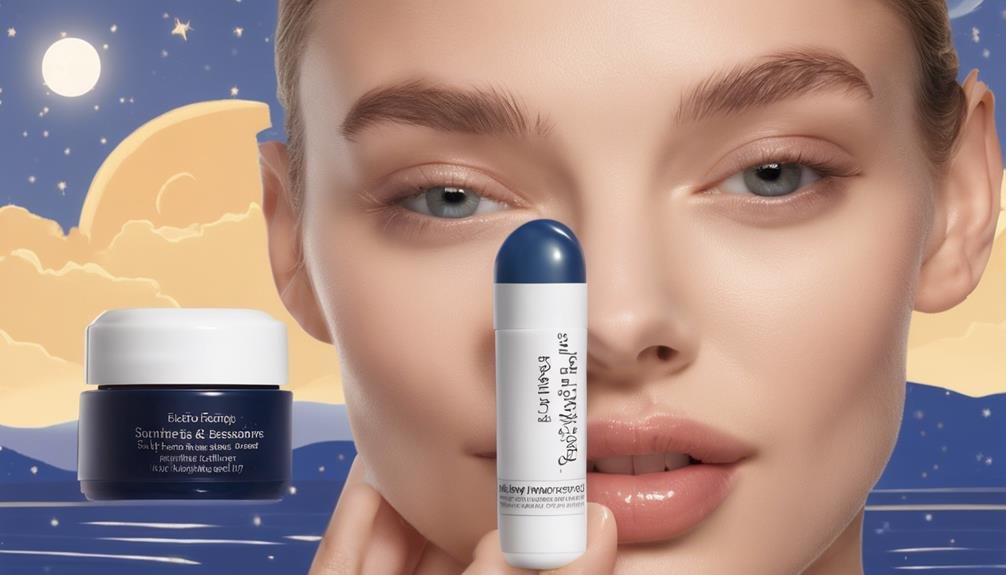You know the importance of a consistent skincare routine, but have you considered the specific essentials needed for day and night? From protecting your skin against environmental stressors during the day to promoting repair and rejuvenation while you sleep, the products you choose can make a significant difference in your skin's overall health. So, what are the key essentials for your day and night skincare regimen that can help you achieve that coveted radiant complexion? Let's explore the must-have products that can elevate your skincare routine and unlock the secret to glowing skin.
Key Takeaways
- Use lightweight moisturizer with SPF during the day for hydration and sun protection.
- Apply serums after cleansing and toning to target specific skin concerns effectively.
- Use richer moisturizers at night to nourish and repair the skin while you sleep.
- Incorporate eye creams in both morning and evening routines for delicate eye area care.
- Consider sheet masks for instant nourishment and hydration, leaving skin revitalized.
Cleansers
When it comes to your skincare routine, choosing the right cleanser is crucial for maintaining healthy and glowing skin. Cleansers are the foundation of any skincare regimen as they help remove dirt, oil, and impurities that can accumulate on your skin throughout the day.
It's essential to select a cleanser that suits your skin type, whether you have dry, oily, combination, or sensitive skin.
For dry skin, opt for a gentle, hydrating cleanser that won't strip your skin of its natural oils.
Oily skin benefits from a foaming or gel-based cleanser that helps control excess oil production.
If you have combination skin, consider using a mild cleanser that can balance both oily and dry areas.
Individuals with sensitive skin should choose a fragrance-free, hypoallergenic cleanser to prevent irritation.
Remember to cleanse your face twice a day, in the morning and evening, to maintain a clean and clear complexion. Avoid harsh ingredients like sulfates and alcohol, as they can be drying and irritating to the skin.
Serums
As you focus on maintaining healthy and glowing skin through your skincare routine, the next step after cleansing is incorporating serums. Serums are lightweight, fast-absorbing liquids that contain high concentrations of active ingredients designed to target specific skin concerns. These potent formulas are packed with beneficial components such as antioxidants, vitamins, and peptides, which can address issues like fine lines, uneven skin tone, and dehydration.
When selecting a serum, it's essential to consider your skin type and concerns. For example, if you have dry skin, look for serums containing hyaluronic acid to boost hydration. Those with concerns about aging may benefit from serums with retinol or vitamin C to promote collagen production and brighten the skin. Acne-prone individuals can opt for serums with ingredients like salicylic acid to unclog pores and reduce breakouts.
Incorporating a serum into your skincare routine can enhance the overall effectiveness of your products and help you achieve radiant, healthy-looking skin. Remember to apply serums after cleansing and toning, but before moisturizing, to allow the active ingredients to penetrate deeply into the skin.
Moisturizers
To effectively nourish and protect your skin, incorporating a quality moisturizer into your daily skincare regimen is crucial. Moisturizers play a vital role in maintaining skin health by hydrating and sealing in moisture, helping to prevent issues like dryness, flakiness, and premature aging.
When choosing a moisturizer, opt for one that suits your skin type – whether you have dry, oily, combination, or sensitive skin. Look for key ingredients like hyaluronic acid, glycerin, ceramides, or shea butter, known for their hydrating and nourishing properties.
For daytime use, select a lightweight moisturizer with added benefits like SPF to protect your skin from harmful UV rays. Nighttime is ideal for using richer, more emollient moisturizers that can work on repairing and rejuvenating your skin while you sleep.
Sunscreen
For optimal skin protection against harmful UV rays, incorporating a high-quality sunscreen into your daily skincare routine is imperative. Sunscreen not only helps prevent sunburn but also reduces the risk of skin cancer and premature aging.
When selecting a sunscreen, consider the following:
- Broad Spectrum: Look for a sunscreen labeled as "broad spectrum" to ensure protection against both UVA and UVB rays.
- SPF 30 or Higher: Choose a sunscreen with a sun protection factor (SPF) of 30 or higher for adequate protection. Remember to reapply every two hours, especially when outdoors.
- Water-Resistant: Opt for a water-resistant formula if you'll be sweating or swimming to maintain effectiveness.
Eye Creams
Enhancing the delicate skin around your eyes requires targeted care, and that's where eye creams play a crucial role. The skin around the eyes is thinner and more prone to dryness and fine lines, making it essential to incorporate a specialized eye cream into your skincare routine.
Eye creams are formulated with ingredients like hyaluronic acid, peptides, retinol, and antioxidants to address concerns such as puffiness, dark circles, wrinkles, and sagging skin.
When choosing an eye cream, look for products with hydrating ingredients to plump and moisturize the skin, as well as antioxidants to protect against environmental stressors. Additionally, ingredients like retinol can help stimulate collagen production, reducing the appearance of fine lines and wrinkles over time.
Remember to gently pat the eye cream around the orbital bone using your ring finger to avoid tugging on the delicate skin.
Incorporating an eye cream into both your morning and evening skincare routines can help nourish and protect the fragile skin around your eyes, promoting a more youthful and radiant appearance.
Exfoliators
A crucial step in your skincare routine is incorporating exfoliators to help remove dead skin cells, unclog pores, and promote a smoother, brighter complexion. Exfoliating 1-2 times a week can revitalize your skin by eliminating buildup and allowing other skincare products to penetrate more effectively.
Here are three types of exfoliators to consider:
- Physical Exfoliators: These contain small granules or textured ingredients that manually slough off dead skin cells. Look for gentle options to prevent irritation and micro-tears on the skin.
- Chemical Exfoliators: Featuring ingredients like alpha-hydroxy acids (AHAs) or beta-hydroxy acids (BHAs), these exfoliators work by dissolving the bonds between skin cells, aiding in gentle exfoliation and promoting cell turnover.
- Enzyme Exfoliators: These exfoliators use natural enzymes like papain from papaya to break down dead skin cells. Ideal for sensitive skin types, they offer a gentle exfoliation method without abrasive particles.
Face Oils
Wondering how to incorporate Face Oils into your skincare routine for optimal results? Face oils can be a game-changer in your beauty regimen, providing essential nourishment and hydration to your skin.
When selecting a face oil, look for ingredients like jojoba oil, rosehip oil, or argan oil, known for their moisturizing and anti-aging properties. These oils can help lock in moisture, improve skin elasticity, and even out skin tone.
To incorporate face oils into your routine, apply a few drops to your fingertips and gently massage the oil onto your clean, damp skin. You can use face oils in the morning or evening, depending on your preference.
In the morning, face oils can create a smooth base for makeup application, while at night, they can work their magic as you sleep, promoting skin repair and rejuvenation.
Night Creams
Night creams are a crucial component of an effective skincare routine, providing your skin with much-needed hydration and nourishment while you sleep. These creams work tirelessly overnight to repair and rejuvenate your skin, ensuring you wake up with a glowing complexion.
Here are three essential benefits of incorporating a night cream into your regimen:
- Deep Hydration: Night creams are formulated with rich ingredients that deeply hydrate your skin, helping to combat dryness and replenish moisture lost during the day.
- Cellular Repair: The active ingredients in night creams promote cellular repair and regeneration, aiding in the healing of damaged skin cells and reducing signs of aging.
- Nutrient Absorption: While you sleep, your skin is more receptive to nutrients. Night creams deliver vital vitamins and antioxidants that nourish your skin from within, promoting a healthy and radiant appearance.
Choosing a night cream tailored to your skin type and concerns can significantly enhance your skincare routine, ensuring you wake up to refreshed and revitalized skin every morning.
Sheet Masks
Curious about a skincare treatment that can provide instant nourishment and hydration to your skin? Sheet masks might just be the answer you've been looking for. These beauty essentials are infused with potent serums and ingredients that can revitalize your skin in just a single use.
Sheet masks are thin sheets made of various materials like cotton or hydrogel, soaked in a concentrated serum packed with vitamins, antioxidants, and other beneficial compounds. They're designed to adhere to your face, allowing the active ingredients to penetrate deeply into your skin.
Using a sheet mask is a simple and relaxing process. After cleansing and toning your skin, carefully unfold the mask and apply it to your face. Leave it on for about 15-20 minutes to let your skin soak up all the goodness. Once you remove the mask, gently pat the remaining serum into your skin for maximum absorption.
Incorporating sheet masks into your skincare routine can provide an extra boost of hydration, brightening, or rejuvenation whenever your skin needs a pick-me-up.
Spot Treatments
For targeted solutions to specific skin concerns, spot treatments are a valuable addition to your skincare arsenal. These potent formulations are designed to address pesky blemishes, dark spots, and other imperfections, helping you achieve a clearer and more radiant complexion.
Here are three powerful spot treatments to consider incorporating into your skincare routine:
- Salicylic Acid Spot Treatment: This ingredient is known for its ability to unclog pores and reduce inflammation, making it ideal for treating acne breakouts. Apply a small amount directly onto blemishes to help them heal faster.
- Vitamin C Serum for Dark Spots: Vitamin C is a potent antioxidant that can help fade dark spots and even out skin tone. Gently dab the serum onto areas with hyperpigmentation for a brighter complexion.
- Tea Tree Oil Spot Treatment: With its antimicrobial properties, tea tree oil is effective in combating acne-causing bacteria. Dilute a drop of tea tree oil with a carrier oil and apply it to blemishes to help clear them up.
Integrating these targeted treatments into your skincare routine can provide tailored solutions to specific skin issues, promoting a healthier and more balanced complexion.
Lip Balms
Gently nourishing and protecting your lips is a crucial aspect of a comprehensive skincare regimen. Your lips are delicate and require special attention to stay hydrated and healthy. Lip balms are a go-to solution for keeping your lips soft, smooth, and moisturized throughout the day and night.
| Lip Balm | Key Ingredients |
|---|---|
| 1. Burt's Bees | Beeswax, Vitamin E, Peppermint Oil |
| 2. Aquaphor | Glycerin, Panthenol, Bisabolol |
| 3. Laneige | Vitamin C, Shea Butter, Murumuru Butter |
| 4. Nivea | Shea Butter, Castor Seed Oil, Jojoba Oil |
| 5. Fresh | Sugar, Meadowfoam Seed Oil, Black Currant Seed Oil |
When choosing a lip balm, look for ingredients like beeswax, shea butter, and essential oils that provide deep hydration and protection. Applying lip balm regularly, especially before bed, can prevent dryness, chapping, and cracking. Remember, well-nourished lips not only feel great but also enhance your overall skincare routine.
Sleeping Masks
After nourishing your lips with hydrating lip balms, consider incorporating sleeping masks into your skincare routine for added overnight rejuvenation. Sleeping masks are potent treatments that work wonders while you rest, providing deep hydration and nourishment to your skin.
Here are three reasons why sleeping masks are essential for your nighttime skincare regimen:
- Intense Hydration: Sleeping masks are formulated to penetrate deeply into your skin overnight, delivering intense hydration to plump and revitalize your complexion.
- Repair and Renewal: These masks contain powerful ingredients that aid in repairing and renewing your skin cells, promoting a more radiant and youthful appearance by morning.
- Locking in Moisture: By creating a barrier over your skin, sleeping masks help lock in all the goodness from your previous skincare steps, ensuring maximum absorption and benefits throughout the night.
Incorporating a sleeping mask into your nightly routine can elevate your skincare regimen, leaving you with glowing and revitalized skin every morning.
Frequently Asked Questions
Can I Use My Night Cream During the Day?
You can use your night cream during the day, but it may not provide the necessary protection from the sun. Day creams typically have SPF and antioxidants. Consider switching to a day cream for better daytime skin care.
How Often Should I Exfoliate My Skin?
You should exfoliate your skin 1-3 times per week, depending on your skin type. Regular exfoliation helps remove dead skin cells, unclog pores, and improve skin texture. Remember to follow with a hydrating moisturizer and sunscreen during the day.
What Is the Best Way to Store Sheet Masks?
To keep sheet masks fresh, store them in a cool, dry place away from direct sunlight. A bathroom cabinet or skincare fridge works well. Avoid extreme temperatures. Always seal the packet properly to prevent drying out.
Can I Use Spot Treatments on My Entire Face?
Yes, you can use spot treatments on your entire face if the product is designed for all-over application. However, be cautious with potent formulas to prevent irritation. Always perform a patch test beforehand and follow the product instructions carefully.
Should I Apply Eye Cream Before or After Moisturizer?
Before applying moisturizer, gently dab eye cream around your eyes. This helps maintain the delicate skin's hydration and targets specific concerns. Remember, eye cream should be applied before moisturizer to maximize its benefits.
Conclusion
In conclusion, just as a symphony needs each instrument to create harmony, your day and night skincare essentials work together to orchestrate a beautiful composition for your skin. By incorporating cleansers, serums, moisturizers, sunscreen, eye creams, sheet masks, spot treatments, lip balms, and sleeping masks into your routine, you are providing your skin with the necessary tools to thrive and glow. Remember, consistency is key in achieving healthy and radiant skin.







